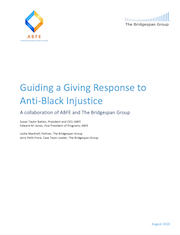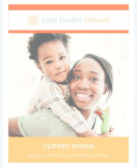Site Search
- resource provided by the Forum Network Knowledgebase.
Search Tip: Search with " " to find exact matches.
This report from the TCC Group finds that the flexibility, nimbleness, and willingness to collaborate demonstrated by the philanthropic sector over the past year in response to a rapidly changing policy environment could serve as a model for the sector going forward.
Based on interviews with nearly thirty leaders of philanthropy-serving organizations (PSOs), this report found that in the first year of the Trump administration, PSOs and funder collaboratives were called on to keep funders well informed of policy changes. To that end, PSOs have played a critical role in enabling funder learning, dialogue, and action, and have helped accelerate important funder conversations in the areas of diversity, equity, and inclusion; the need to think beyond issue silos; and the foundational benefits of creating space for dialogue across political and ideological divides through nonpartisan civic engagement.
The report also notes that while some funders have remained cautious, taking a "wait and see" approach to how national political changes might affect their grantmaking priorities, a greater number have been moved by rapidly changing policies to consider aligning their "institutional voice" with other grantmakers to maximize their impact.

The Bridgespan Group collaborated with ABFE to co-author "Guiding a Giving Response to Anti-Black Injustice," with additional input from proximate leaders. This memo offers philanthropy potential paths to invest in organizations and movements within the Black-led racial justice ecosystem. It provides principles for giving that can help funders make investments with sustained change in mind, and highlights priority investment areas and example organizations within those areas that represent tangible opportunities. Our list is not exhaustive, but rather a starting place for funders who seek to support Black-led organizations and movements committed to anti-racist social change.
Since formally organized as a 501(c)3 non-profit in 1997, CNJG has been actively engaged in a number of landmark initiatives including commissioning the first study of giving in the Garden State, NJ Gives, the first study of nonprofit health insurance provider conversions to for profit corporations, New Jersey Together (a major funder collaborative centered on youth development), a landmark effort looking at the systemic, long term fiscal challenges facing all levels of government in New Jersey entitled Facing Our Future, the creation of the Community Foundation of South Jersey, and creation of the Newark Philanthropic Liaison position within our state’s largest city administration.
Learn about a new report on the care economy narrative change landscape in the U.S. supported by the Care for All with Respect and Equity (CARE) Fund and developed by Asset Funders Network, Economic Opportunity Funders, Early Childhood Funders Collaborative, Grantmakers In Aging, Grantmakers In Health, and Disability & Philanthropy Forum.
Coming together for the first time across issues and constituencies represented by this diverse range of PSOs, the discussion will center the evolving landscape of narrative change efforts across the care economy, lessons being learned by practitioners and by funders, and potential opportunities for further learning and action.
Cost: Free for Members and Non Members
One of our longest and most successful public-private partnerships in Newark, the Summer Youth Employment Program empowers youth each year with a job, workforce training, financial literacy, and coaching and mentoring. Thanks to the support of more than 15 funding partners, we were able to employ just over 2,000 youth in 2025 and raised over $3 million. Newark SYEP is the biggest summer program in New Jersey thanks to the collaborative leadership of the Liaison.
What comes after “strategic...?” If you said, “planning,” you’re not alone. And for many leaders of community foundations, especially small ones who don’t have the time or money for a big process, anxiety is the feeling that follows. If that’s the case, this guide is for you.
It invites you to test-drive some activities to bring your current program, operations and community leadership strategies into focus before you decide whether to create a plan or not. It helps you discover ongoing strategic practices and decide whether to keep them or not. If you already have done a strategic plan, and it is languishing on a shelf, this guide will help you refresh it.
PART A: Good Strategy Takes Practice (Not Just Planning)
PART B: Do Your Discovery
PART C: Jumpstart Your Strategy Narrative
PART D: Bring It Together
Looking To What’s Next
This tool for unstaffed foundations includes an accountability self-assessment and a legal checklist. It is divided into nine topic sections, each of which is divided into three levels, which can help foundations tailor the tool to meet their specific interests and needs. Also included are an Excel spreadsheet to help tabulate responses, an extensive accountability resource list, and a glossary of key words and concepts used in the tool.
The Council of New Jersey Grantmakers joins the Funders Census Initiative, United Philanthropy Forum, and philanthropy-serving organizations around the country in asking our members to support and encourage a fair and accurate Census in 2020.
Inaccurate Census information means too many voices go unheard.
It means decisions about funding and services crucial to promoting thriving communities aren’t based on real needs.
And, it threatens the full exercise of democracy itself.
Of particular concern is a controversial proposed question that would ask household members whether they are US citizens. The Council shares with our colleagues across the nation serious concern about this question. The question hasn’t been thoroughly tested, and it is likely to significantly depress response rates and critically reduce overall Census participation.
We encourage you to weigh in on this and other matters related to the Census.
The US Department of Commerce Department (which oversees the Census Bureau) published a notice in the Federal Register seeking public comments on 2020 Census data collection operations. The public has until August 7 to submit comments.
There are several things you and your grantees can do to stand up for a fair, accurate Census:
- Sign on to a letter specifically for foundations drafted by FCI.
- Write your own letter in support of a full, accurate and just 2020 Census.
- Submit personal comments by August 7.
- Ask 10 colleagues to do the same.
In case you’re wondering, submitting comments is not considered lobbying. So, private foundations can weigh in on this question, and public charities — including community foundations — can do so without tracking and reporting it as lobbying on their 990s. A recent blog from Bolder Advocacy addresses this issue.
As a regional association and philanthropy-serving organization, CNJG signed on to a letter organized by United Philanthropy Forum urging withdrawal of the citizenship question from the 2020 US Census. The letter in part states:
Please feel free to reach out to me or Theresa Jacks, CNJG Deputy Director, for information about the Council’s work on behalf of a fair and accurate 2020 US Census.
Sincerely,
Jon Shure, Interim President/CEO
Council of New Jersey Grantmakers

Giving circles and other forms of collective giving (hereafter referred to as GCs) have grown significantly in visibility and popularity over the past 15 years. Often started by donors, they are widely understood to be highly flexible, democratic, do-ityourself vehicles for giving. Previous research has illuminated the positive impact that participation has on the giving and civic engagement of donors. Until recently, however, our understanding of the scope and scale of GCs was 10 years out of date!
This research presents an updated understanding of the current landscape of GCs and similar models of collective giving or giving collaboratives in the United States. This research comprises the first of a three-part inquiry, which also looks at research underway related to the impact of participation in GCs on donor giving and civic engagement, and a study of the relationships between GCs and their hosting organizations.
The Regional Foundation announced $1,950,000 in Implementation Grants to three organizations throughout New Jersey. The Neighborhood Implementation Grants program supports comprehensive community development plans that target specific neighborhoods, are resident-driven, and equity-focused. The multi-year funding is designed to assist the foundation’s grantee partners to start or sustain momentum in their comprehensive neighborhood revitalization initiatives.
“The grant investments announced today reflect the foundation’s ongoing commitment to sustained funding for our partners” stated Kevin Dow, Executive Director of the foundation. “Habitat and Parkside are strong partners doing amazing work including collaborations with other foundation partners and NJCDC is exciting as it moves our long-standing partnership from neighborhood planning to implementation and deepens our support in Paterson.”
